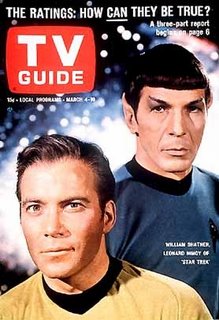
Eyewear celebrates the 40th anniversary of Star Trek's first mission, and transmission, on September 8, 1966. Despite the claims from the site below, this televisual classic dramatic series, arguably the Shakespearean-standard by which all other shows must be judged, has not had the deep space impact of "Jesus"; Lennon-sized grandiosity aside, Star Trek is one of the five most significant cultural artifacts of the '60s - along with The Beatles, Mad Magazine, Bob Dylan, and the Viet Nam War.
For purists, all the spin-offs (and there have been more than for any other TV creation) cannot duplicate the magic of the Original Series, with its curiously perfect alchemy of personalities, namely, Spock's, Kirk's and McCoy's. Indeed, despite the jokes (boulders light as cotton; disposable lieutenants and ensigns; collisions that threw the crew about like popcorn on the bridge) what remains of the series is love. These characters, rounded, real, and flawed-but-heroic, ultimately are always made to decide what love is (Kirk kissing another space gal in lingerie, Spock's mind-meld): the love determined their course. In terms of story arc, then, friendship, loyalty, and mercy form the core values, plot the trajectory, and this remains moving - is, in fact, timeless.
Of course, the show was also political (inter-racial snogs; societies that aped fascism and gangsterism; gods that still wanted to be worshipped; federations dedicated to peace and science) - but never utopian, its idealism tempered by the existence of forces always threatening a better vision of things.
Other guiltier pleasures remain, ones that, sadly, the plan to remaster the original episodes will somewhat diminish, for I love the strange orange, and purple, and pink glow; the shoosh of the doors sliding open and shut; the beaming up sound; the implausibly dramatic music, with its bathetic crescendos and suspenseful glockenspiels. It was all of a package - to my mind, as a child then, an adult now, irreducibly great. From the sweat on Kirk's meaty torso, to Spock's ears, the look and feel of Star Trek was weirdly true to itself. Who is not comforted by an episode, beaming the '60s back to us with all their confusion and certainties?
As to the canon, some of the greatest episodes might be Amok Time; Devil In The Dark; and Mirror, Mirror. I have rewatched The Trouble with Tribbles and find it trite and overly-comedic. Star Trek was surely at its best when tragi-comic, not mock-epic. What astounds, in retrospect, is how fine the writing was, episode to episode. As a former TV writer myself, I can attest to the need for a great story editor (or show-runner) - and both Gene Rodenberry and DC Fontana (Sci-Fi's greatest woman creative arguably) were near-geniuses.
40 years ago? Like one of many Star Trek episodes itself, where time is but an anomaly, a different stream to step into, it seems just 45 minutes ago. Beam me up, Scotty.
http://www.startrek.com/startrek/view/news/article/25215.html
For purists, all the spin-offs (and there have been more than for any other TV creation) cannot duplicate the magic of the Original Series, with its curiously perfect alchemy of personalities, namely, Spock's, Kirk's and McCoy's. Indeed, despite the jokes (boulders light as cotton; disposable lieutenants and ensigns; collisions that threw the crew about like popcorn on the bridge) what remains of the series is love. These characters, rounded, real, and flawed-but-heroic, ultimately are always made to decide what love is (Kirk kissing another space gal in lingerie, Spock's mind-meld): the love determined their course. In terms of story arc, then, friendship, loyalty, and mercy form the core values, plot the trajectory, and this remains moving - is, in fact, timeless.
Of course, the show was also political (inter-racial snogs; societies that aped fascism and gangsterism; gods that still wanted to be worshipped; federations dedicated to peace and science) - but never utopian, its idealism tempered by the existence of forces always threatening a better vision of things.
Other guiltier pleasures remain, ones that, sadly, the plan to remaster the original episodes will somewhat diminish, for I love the strange orange, and purple, and pink glow; the shoosh of the doors sliding open and shut; the beaming up sound; the implausibly dramatic music, with its bathetic crescendos and suspenseful glockenspiels. It was all of a package - to my mind, as a child then, an adult now, irreducibly great. From the sweat on Kirk's meaty torso, to Spock's ears, the look and feel of Star Trek was weirdly true to itself. Who is not comforted by an episode, beaming the '60s back to us with all their confusion and certainties?
As to the canon, some of the greatest episodes might be Amok Time; Devil In The Dark; and Mirror, Mirror. I have rewatched The Trouble with Tribbles and find it trite and overly-comedic. Star Trek was surely at its best when tragi-comic, not mock-epic. What astounds, in retrospect, is how fine the writing was, episode to episode. As a former TV writer myself, I can attest to the need for a great story editor (or show-runner) - and both Gene Rodenberry and DC Fontana (Sci-Fi's greatest woman creative arguably) were near-geniuses.
40 years ago? Like one of many Star Trek episodes itself, where time is but an anomaly, a different stream to step into, it seems just 45 minutes ago. Beam me up, Scotty.
http://www.startrek.com/startrek/view/news/article/25215.html
Comments